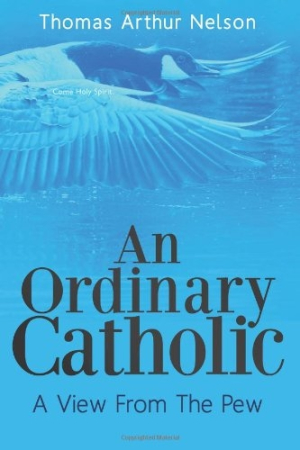An Ordinary Catholic
A View from the Pew
A devout Catholic for most of his more than eighty years, Thomas Arthur Nelson has, like so many of his faith, broken with the church and its hierarchy over what he believes is a hostile stance on homosexuality, same-sex marriage, and contraception.
For Nelson, this is more than just a matter of his belief that “God does not hate.” It is also a personal crusade launched in defense of his son, a gay man whose anguish and guilt over his sexuality led him to nearly commit suicide. Most of An Ordinary Catholic is an argument in support of love regardless of sexual orientation. It is also a passionate explanation of how Nelson has come to believe that the Catholic Church and its “rigid aristocracy” have forgotten the true message of Christ.
Those wrestling with similar issues may find comfort in reading about the struggles faced by Nelson and his family. Some may become lost in the author’s musings and meanderings, but he does eventually return to his central theme. Nelson does not pretend to be a theologian. As such, those seeking a more philosophical or canon law defense of how the Catholic Church should address the issue of homosexuality will need to look elsewhere.
This does not mean, however, that Nelson lacks credentials. A lifelong Catholic and a graduate of Notre Dame, the author writes from deep personal knowledge and experience of what it means to be Catholic. This is someone who, as an altar boy during World War II, prayed nightly to God to “lead [him] into temptation” so that he could be tested and prove himself worthy. Nelson shares similar snippets and anecdotes from his eight decades to illustrate how vital being a Catholic was to the world he built for his wife and their six children.
Attempting to reconcile his faith, his church’s stance on homosexuality, and his love for his son has played hell with Nelson, and he is not alone in this struggle. He writes honestly and emotionally about what he sees as the failings of Catholicism in regard to homosexuality, contraception, and what he calls the “affliction” of celibacy upon its clergy. Nelson also chides the Church for what he believes is an antiquated, dogmatic, and anti-democratic mindset that goes against the very type of “independent thinking” that the Jesuits taught him in school.
An Ordinary Catholic is, as the author says, “a labor of faith,” a cry from the “peasants” in the pews to the “princes” in the pulpit. That Nelson chose to illustrate and defend his position through a passionate memoir rather than a theology-based position gives his writing the very authenticity and humanity that his cry for justice—and, most of all, for love—demands.
Reviewed by
Mark McLaughlin
Disclosure: This article is not an endorsement, but a review. The publisher of this book provided free copies of the book and paid a small fee to have their book reviewed by a professional reviewer. Foreword Reviews and Clarion Reviews make no guarantee that the publisher will receive a positive review. Foreword Magazine, Inc. is disclosing this in accordance with the Federal Trade Commission’s 16 CFR, Part 255.

